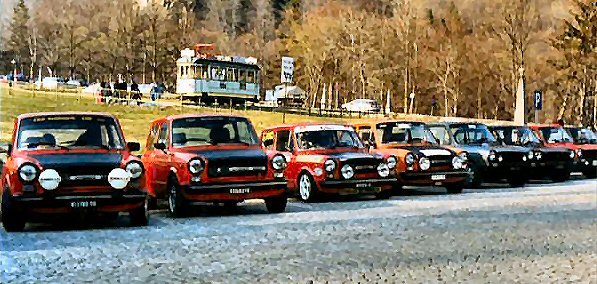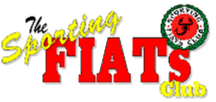Background
and Beginnings
From the middle of the fifties and about the same time as the Mini was
developed, Fiat had been experimenting with front wheel drive. During
the early sixties Fiat allied their front wheel drive concepts with
the obvious weight and cost advantages of three and two box transverse
engine configurations. By 1963 they had three versions of front wheel
drive prototypes around, including the forerunner of the 128. But they
were very nervous about its launch in Italy and so decided to 'market
test' the concept under the Autobianchi brand instead, initially as
the Autobianchi Primula - also coded the Autobianchi A111. A smaller
version of the Primula was already penned, and Autobianchi proceeded
to bring this to market rapidly, so as Fiat produced the 850 series
Autobianchi launched the A112 taking full advantage of 850 mechanicals
but in another front wheel drive and transverse engined car.
| |
|
The
Autobianchi history begins with Edoardo Bianchi in 1899, initially
making bicycles, and in 1901 the workshop produced a first motor
driven bike. By 1905 they produced their first auto in competition
with Fiat's own 12HP. But war and investment problems during the
1920s and '30s left Bianchi as a backwater.
.
In
1955 Fiat and Pirelli helped re-launch the company with the 1957
Bianchina - under the Autobianchi name. A smaller 2 seater followed,
using Fiat 500 running gea, then an estate - the Panoramica. And
Fiat continued to use the company as a technical and marketing
test bed. This was never more important to Fiat when they tested
their first front wheel transverse engine design in the Autbianchi
Primula (and A111) from the mid sixties.
.
The
outstanding popumarity of the A112 followed on from 1969, and
when Lancia joined the Fiat Group Autobianchi' was moved into
the Lancia organisation, but retained a presence during the early
years of the Y10 when some models were badged Autobianchi. And
so the Milano company was finally absorbed into Lancia. |
In
October 1969 Autobianchi launched the A112, and it proved very popular
in Europe, continuing to being built right up to 1985. Autobianchi's
approach was to market Fiat's engineering with additional comforts
- rather like Lancia where to do later, and in fact A112s were sold
through Lancia distributors in some countries. Within two years, in
1971, Fiat's newly acquired performance specialists, Abarth, had launched
a faster version of the A112 and another little classic was born.
.
The
Car
So Autobianchi made the A112 into a more refined version of the
Fiat 850 saloon. It was designed with a wheel base of 203.8 centimetres
and could comfortably carry four adults with some more luggage room.
The rear seat also dropped down to extend the luggage space if needed.
Mechanical components were derived from the Fiat 850 series, with
its synchro box and anti-clockwise rotating engine taken from the
850 Sport, and delivering 44 bhp from its 903cc's. Emulating the
850 original, the car was light, weighing around 680 kg and therefore
providing a good power to weight ratio for the time. The A112 reached
a top speed of 135 km/h, with an acceleration of 0 -100 km/h in
about 15 seconds.
In all the A112 road holding and handling characteristics are similar
to the taught and highly responsive Fiat 850, although the A112's
all round independent suspension and front wheel drive understeer
behaviour were quite novel for the
time and a contrast to the rear engined 850 saloon. It was an excellent
little performer.... and there is a good case to say it was one of
the first of the superminis!
Production
Numbers
A112 production
numbers are impresssive, reflecting a large and loyal following
for the cars both in Italy and Northern Europe, with over 1,2 million
cars sold over seventeen years.
Model |
Years |
Totals |
| A112 |
(1969-1971) |
105,937 |
| A112, E, Elegant, Abarth 58 |
(1971-1978) |
504,648 |
| A112 in 1973 |
(1973) |
106,659 |
| A112 Abarth 70 |
(1974-1985) |
117,351 |
| A112
Elite, Junior, Appia |
(1979-1985) |
308,320 |
| A112 LX |
(1982-1985) |
35,082 |
| |
|
|
Popularity
of the A112 was sustained, initially after the 1973 oil crisis, but
sales continued at a similar rate into the early eighties, partly due
to Autobianchi's vigorous update policy. This has produced a large series
of models, numbering seven. Special versions were also made, for which
seperate figures are not available from Fiat. These included the Abarth
Goldring and Juventus.
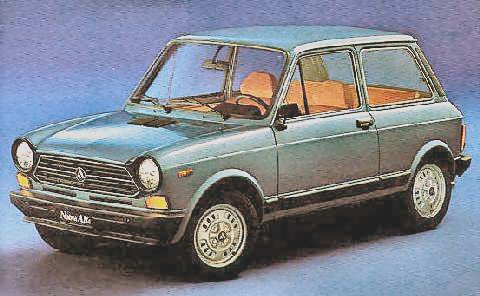

A112
Models
Perhaps the most famous of the A112 variants is the Abarth. Carlo Abarth's
company had already developed a 1000cc race version of the Fiat 903cc
engine and allied to the low weight and crisp handling characteristics
of the A112 Abarth created another great little Abarth.
Quite soon after the A112's sales launch in 1969, A112 Abarth prototypes
were spotted around Milan and their Corso Marche premises. By the time
the road going version was ready for production in 1971, they were producing
about 100 bhp in race form. But when the A112 Abarth road version was
on sale the same year they were quoted at 58 bhp - and were badged as
"58" accordingly. Some prototype development work had been needed to
provide a reliable transmission which was forgiving enough for everyday
town use.
Inside the A112 Abarth is fitted with a generous instrument panel including
a prominent tachometer indicating a red line of 7000 rpm. Alongside,
supplementary instruments include ammeter, oil pressure and temperature
gauges. An Abarth leather steering wheel and Sport Seats complete the
interior equipment. The Abarth engine, is also provided with an oil
cooler, strengthened sump and heavy duty radiator as well as stiffer
suspension and bushes, and an uprated transmission. The 58HP will accelerate
from 0-100 km/h in about 12 seconds, with a top speed of over 150 km/h
at the 7000rpm red line. Abarth's involvement with the A112 was very
much integrated with the main model updates and sales throughout the
seventies.
In 1974 Abarth produced a new 70bhp A112 Abarth. This version was mechanically
similar to the 58, and included an uprated fuel pump and distributor
mount, but especially an upgraded brake system with servo assistance.
From 1977 the servo was dropped, Abarth favouring a bigger master cylinder
instead.
Autobianchi also produced a revised interior for the 1974 A112 'Elegant'
with carpets throughout the car - including the rear luggage area, and
full a cloth interior trim with matching seats. A tachometer was also
included in the instrumentation. The engine was as standard with the
903cc 44 bhp configuration. The first of these models had a two-color
finish, and thick impact bumpers, but the two tone cars were quickly
discontinued. In 1975 A112s were given the now classic larger rear lights.
And by 1977 some 600,000 A112s had been made.
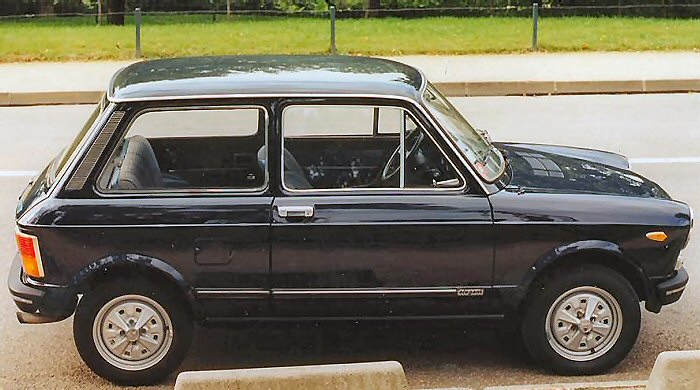
The first major update of the model came in 1978. The roof line and
height were changed and the frontal look revised with a new plastic
grill. Its tail light clusters were again revised, and plastic impact
bumpers added, with coordinating black plastic side strips. Engine capacity
was also increased for the 'Elegant' to 962cc giving 48 bhp as standard.
At the same time the transmission was strengthened.
The interior, and instrument binacle was changed too - out went the
original instruments in favour of Lambourghini derived equivalents...
and the auxiliary instruments in the Abarth version were now dropped
below the eyeline. The Abarth versions now got a fake air scoop on the
bonnet.
At the same time German importer W Hagen developed a conversion kit
for the A112, comprising spoilers, Abarth rims (type CD 30, 5,5x13)
and a set of wheel arch extensions, which could also be fitted to the
standard A112 as new. It proved very popular although rework of the
wheel arches was required to fit the larger wheels but such cars will
lack the Abarth tuning and peformance modifications. Adding larger wheels
to A112s is nearely as complex as modifying the Fiat 500s for the same
purpose and such cars should be inspected carefully.
In 1980 the A112 recieved some further updates with heavier used of
plastic on the doors and rear flanks, and matching black plastic wheel
arches but the mechanical components remained the same. Lancia took
aver the marketing of the model and the brand Autobianchi was dropped
in some countries.
Final changes were made in 1982 when the plastic bumpers/valences were
increased in size and included driving lights, and the lateral strips
were colour coordinated with the car. By the time the last A112 rolled
off the production line in 1986, more than 1.2 million had been produced.
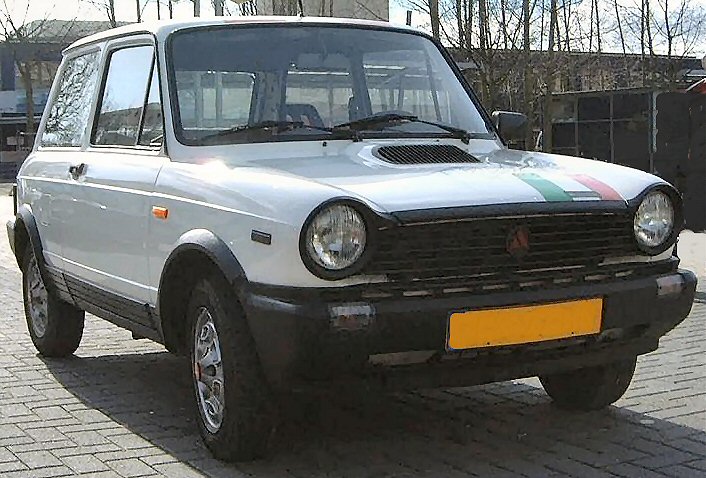
Tuning
Fortunately there are very well trodden paths based upon the Abarth
develoment line and the Fiat 850s.
These cars were often raced with great success in the seventies and
versions of these modifications abound across the internet.
The 850 sport setup in particular was quite heavily tuned as standard...
and so the components are highly stressed already - for Fiats. When
considering additional power, you should budget to completely renew
everything.... by this I mean the cooling, carburation, exhaust system
and block rigidity must be addressed, and it is essential that the transmission
suspension and brakes are completely upgraded.
The A112 Timeline
A summary of the extensive range of models offered by Autobianchi over
seventeen years is provided below:
|
A112
Model |
Years |
cc |
bhp |
km/h |
weight |
| Series 1 |
A112 |
1969-1971 |
903 |
44 |
135+ |
625kg |
| |
A112 E |
1971-1973 |
903 |
44 |
135+ |
640kg |
| |
A112 Abarth |
1971-1973 |
982 |
58 |
150 |
660kg |
| Series 2 |
A112 |
1971-1974 |
903 |
47 |
138 |
645kg |
| |
A112 Elegant |
1973-1975 |
903 |
44 |
138 |
660kg |
| |
A112 Abarth |
1973-1974 |
982 |
58 |
150 |
670kg |
| Series 3 |
A112 |
1975-1977 |
903 |
42 |
135 |
655kg |
| |
A112 Elegant |
1975-1977 |
903 |
42 |
135 |
670kg |
| |
A112 Abarth 58 |
1975-1976 |
982 |
58 |
150 |
680kg |
| |
A112 Abarth 70 |
1975-1977 |
1050 |
70 |
160 |
700kg |
| |
A112 Juventus |
1975-1977 |
903 |
42 |
130+ |
700kg |
| Series 4 |
A112 |
1978-1979 |
903 |
42 |
135 |
655kg |
| |
A112 Elegant |
1978-1979 |
965 |
48 |
140 |
675kg |
| |
A112 Abarth |
1978-1979 |
1050 |
70 |
160 |
700kg |
| |
A112 Abarth Goldring |
1978-1979 |
1050 |
70 |
160 |
700kg |
| |
A112 Juventus |
1978-1979 |
903 |
42 |
130+ |
700kg+ |
| |
A112 Appia |
1978-1979 |
903 |
42 |
130+ |
700kg+ |
| Series 5 |
A112 Junior |
1979-1982 |
903 |
42 |
135 |
665kg |
| |
A112 Elegant |
1979-1982 |
965 |
48 |
140 |
680kg |
| |
A112 Elite |
1979-1982 |
965 |
48 |
140 |
680kg |
| |
A112 Abarth |
1979-1982 |
1050 |
70 |
160 |
700kg |
| |
A112 Appia |
1979-1982 |
965 |
48 |
137 |
700kg+ |
| Series 6 |
A112 Junior |
1982-1984 |
903 |
42 |
130+ |
675kg |
| |
A112 LX |
1983-1984 |
965 |
48 |
137 |
690kg |
| |
A112 Elite |
1982-1984 |
965 |
48 |
137 |
690kg |
| |
A112 Abarth |
1982-1984 |
1050 |
70 |
155+ |
700kg |
| |
A112 Appia |
1982-1984 |
965 |
48 |
137 |
700kg+ |
| Series 7 |
A112 Junior |
1984-1986 |
903 |
42 |
130+ |
675kg |
| |
A112 LX |
1984-1985 |
965 |
48 |
137 |
690kg |
| |
A112 Elite |
1984-1985 |
965 |
48 |
137 |
690kg |
| |
A112 Abarth |
1984-1985 |
1050 |
70 |
155+ |
700kg |
| |
A112 Appia |
1984-1985 |
965 |
48 |
137 |
700kg+ |
A112 Engines & Unleaded Fuel
Based upon engineering conference information from the mid nineties
at which all the main manufacturers were represented, this was their
best estimate for the A112 engines and ancilliary components (like
carburettors and distrubutors). The question was asked - if switching
to unleaded 95 Octane fuel, or unleaded 98 Octane fuel, would the
engine as installed incur any reduction in life or performance that
could not be accommodated during its normal service cycles?
A112
Model |
Engine
Code |
Unleaded
95
Octane? |
|
| A 112 |
A112A000/A112A500 |
Yes |
Yes |
| Junior |
A112A5000* |
No |
Yes |
| Elegant |
A112B1000 |
No |
Yes |
| Elite |
A112B1000 |
No |
Yes |
| 5.0 |
A112B1000 |
No |
Yes |
| |
All others after 1991 |
Yes |
Yes |
| |
|
|
|
Table
note: * Please note the A112A500 and A112A5000 are different engine
codes!!
.
The conclusion
- as with all the related Fiat engines - is that the engines will incur
no additional wear switching to 98 Octane unleaded if accompanied by
a full service. Also the A112A000/ and A112A500 engines are capable
of accepting 95 Octane unleaded, with a full service, but the A112A5000
and A112B1000 variants will not. This was assumed to be a one time and
permanent switch onto unleaded fuel in each case.
This information
has prompted some discussion on the club forums - regarding the precise
nature of the problems with Unleaded 95 Octane given the close relationship
of these engine variants to one another. The obvious observation is
that it is based on compression ratios and detonation concerns.... but
for some of these engines they are not running higher compressions and
the answer is we really don't know. We don't have the resources in the
club to find out using anything other than a crude Observational Method.
In other words to observe with owner/ members what haopens to the cars
that are switched to using 95 Octane unleaded fuel down the years. So
this information should be treated with caution and we cannot guarantee
its validity.
(See also http://www.sfconline.org.uk/forum/topic.asp?TOPIC_ID=460
)
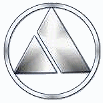
Links
A112 Spares and Advice
Middle Barton Garage www.middlebartongarage.com
Ricambio http://www.ricambio-web.fsnet.co.uk
158 High Street, Banstead, Surrey SM7 2NZ. 0208 642-8577 fax: +44 (0)1737-370091
Guy Moerenhout
http://www.abarth-gmr.be/new/gallery.php?dzial=AUTOBIANCHI%20112
Gozzoli http://www.gozzoli.it
Via Claudia 211, 41053, Maranello MO, Italy. Tele/fax: +39
(0)536-941240
Vitto Elaborazioni http://www.vittoelaborazioni.com
Via Strada dei Frati, 12 36015 Schio Vicenza, Italy
Gruppo Ricambi BIELSTEIN OHG, D-31157 Sarstedt, Tel.: 0049
(0)5066 3074, Fax: 0049 (0)5066 65390 www.bielstein.com
Email: bielstein@bielstein.com
ARE sportteile Tel./fax: 0049 (0)8374 7397
Garda Ricambi, Viale Rovereto, 77 /B I - 38062 Arco (TN), Tel.:
0039 (0)464 519721 Fax: 0039 (0)464 516651
Scorpione Abarth parts, Sleedoorn 10, 7873 CS Odoorn, Holland
Tel: 0031 (0)591 513896 Fax: 0031 (0)591 513896
http://www.scorpioneabarthparts.nl
email: info@scorpioneabarthparts.nl
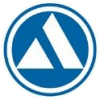
AlfaRome
Cam shafts Carsten Mueller http://www.alfarome.de/
Rinaldi Tuning, NL-7553 DJ Hengelo, Tel./fax: 0031 (0)74 2425129
Scuderia Topolino Dutch and German based Abarth supplier and
very knowledgeable on the A112 - Paul van Heyden http://www.scuderiatopolino.com/
Bacci-Romano provide a comprehensive list of parts for the
Autobianchis at www.bacciromano.com
in particular the 850 rear axle parts, independent axle parts complete
with stub axles and flanges to suit Fiat 850 and Abarth transaxles,
and A112 differentials, cv joints etc. Go to the home page, then 'produtti....',
'listino 2006.....', then 'Autostoriche and 'Ricambi Autostoriche' sections.
Dichtungen-Schwarz Seals and Gaskets for the Abarths and similar
classics if the are listed|:
http://www.Dichtungen-Schwarz.de
.
General
Links
http://www.cibbaoracingteam.com/a112park
very comprehensive database of A112 styles and changes.......
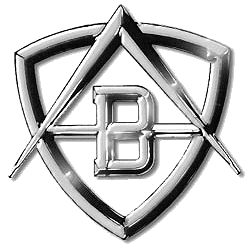
http://www.andreazoppini.it/
http://www.abarthfan.com/eng/index.html
http://www.asahi-net.or.jp/~fn5y-iwt/a112.html
http://www.abarth.ontheweb.nl/
http://www.thiel-tuning.de/
http://www.a112abarth.gr/
Last time I was in
Torino I had a very A112 conversation with Carlo and his Series 2 70HP
Abarth.... so in memory of a good afternoon and a great bunch of fanatics...
this is their
website:
http://www.communities.ninemsn.com/clubautobianchiA112torino
And here's
a day out!
